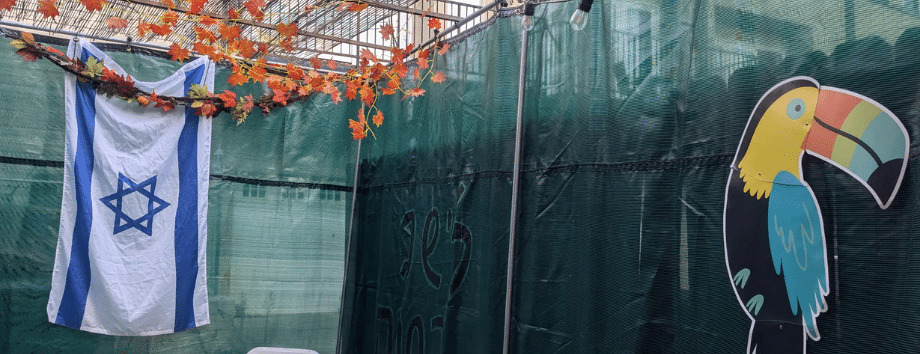How to Celebrate Sukkot in the City
August 19, 2025 | Shabbat and Holidays

By Maggy Kay
I grew up in the DC suburbs with a big yard, and every year during the High Holidays (Rosh Hashanah and Yom Kippur) my dad would hand out little “business cards” during services. They weren’t for work — they were invitations to our family’s open sukkah, just a few days away.
Now, as an adult living in a Baltimore rowhome, I’ve found my own way to keep the tradition alive. When a family friend offered me their lightly used sukkah, I jumped at the chance. These days, my sukkah doesn’t sit on grass but in my parking pad. Sure, it means giving up a parking spot for a few weeks, but it’s a small price to pay to bring one of my favorite childhood memories into my adult life.
Of course, building a sukkah in the city comes with its own quirks and lessons learned:
- Ask your friends to help you set up (and plan ahead). Sukkot always sneaks up right after Yom Kippur, so a little preparation goes a long way. Pick a date, send a text to your friends inviting them to join in on securing the walls, hanging the lights and more.
- Introduce the holiday to non-Jewish friends and neighbors. A sukkah in a parking pad makes people curious and that curiosity is a wonderful entry point for conversation. Use the holiday as an opportunity to share more about a beautiful, lesser-known Jewish tradition.
- Plan for the unexpected rainstorm. Trust me, it’s going to happen. Make sure your decorations can withstand the weather, including laminating those childhood drawings that have already stood the test of time.
This year, I’m especially excited to rebuild my sukkah, which spends the off-season tucked away in a Sukkah Project bag. I’ve picked out some new decorations and am hoping to use real bamboo for s’chach (the natural roofing material that covers the sukkah) instead of the bamboo mats I’ve relied on in the past.
But my favorite part will always be the invites — those little “business cards” I design and hand out, just like my dad. For me, they’re not just about inviting people to sit in the sukkah. They’re about building community, creating memories and keeping a family tradition alive.